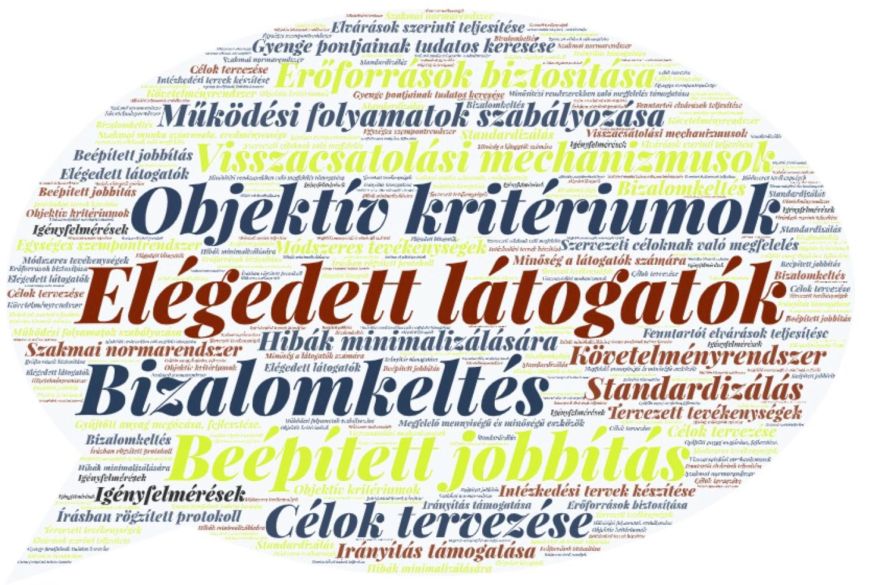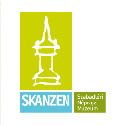Self-reflection, Compass and Framework for Quality-oriented Museums
The first steps towards self-reflection in order to improve museums’ external and internal performance, image, quality of service and visitor satisfaction is definitely not easy to take, though it is never too late, it is the sooner the better to get started with this never ending process.

Most of the Hungarian museum institutions at present consider strategic thinking, renewal and continuous development important, and they have many initiatives related to the issue, trying not to lose sight of the needs and satisfaction of the visitors and the cooperating partners, and even the staff. However, these aspirations are only occasionally fulfilled merely in the context of an exhibition or programme. At most Hungarian museums, we cannot speak of conscious monitoring of operation or system-level quality management, but rather of individual, managerial ambitions and attempts driven by the professionalism of the staff.

In Hungary, the need for quality assurance was first expressed within the public sector in public and higher education, and then in public administrative bodies. Within the cultural field, libraries and public culture institutions already apply a common quality management system developed for the administrative sector of EU Member States, which takes into account a Common Assessment Framework based on self-evaluation. However, there is currently no uniform quality management system in the museum area yet. Notwithstanding, outstanding professional institutions, exhibitions, and programmes are recognized by various professional awards. The Museum of the Year has been awarded since 1996, the Museum Educational Excellence Award since 2003, and the Exhibition of the Year since 2010.
The need for the development of a uniform quality assurance system for museum institutions was expressed in 2016 by the Government of Hungary in the call for EFOP-3.3.3-VEKOP-16-2016-00001 priority project, Museum and Library Development for Everyone.

The project's consortium leader, the Museum Education and Methodology Centre, Hungarian Open Air Museum (SZNM, MOKK), has developed a training module for museum managers titled Towards quality management to raise awareness and increase the competitiveness of the Hungarian museum institutions, and disseminate the service-oriented museum approach. The publication Museum Quality Management Framework as well as the training mean to contribute to the complex research on cultural quality assurance systems within the project.
The editor of the volume and also Acting Director of MOKK and Project Manager of ‘Museum and Library Development for Everyone’ summarized the content and purpose of the publication in the Introduction to the Volume as follows:
‘This volume summarizes the results of research into the preparation of a quality management system. It provides insight into the operation of various quality assurance systems, and outlines how museum activities can be monitored, and gives tools for quality-oriented organizational operation. The museum quality management framework touched upon in this publication should be considered as an ideal model of operation, and it is not recommended to be implemented exactly in its original form. The purpose is to attract as many museums as possible to support the detection and correction of malfunctions of operation, to assist in understanding visitors’ and partners’ needs so as to improve the way they are served, and make the museum’s operation more efficient.’

The authors of Volume 27 of the Museum Compass Series, published by MOKK, are experts on quality assurance: Vera Göndör, dr. Tibor Gregász and Zoltán Kertész are lecturers and quality management experts at the Institute of Media Technology and Light Industry Institute at Óbuda University. Their work was carried out in cooperation with numerous museum professionals. Participants in the development of the quality management framework included the Savaria Municipal Museum with County Scope, the Tomory Lajos Museum, the Hatvany Lajos Museum - Integrated Library and Museum Collection, the Zwack Museum and Visitor Centre and the Hungarian Open Air Museum. The Dobó István Castle Museum and the Museum of the Reformed College of Debrecen assisted in testing the quality management framework. With their comments, suggestions, and practical examples, they have greatly contributed to the development of a flexible framework that takes into account the real needs of museums of different sizes, classification and capabilities.
The volume of Towards Quality Management. Museum Quality Management Framework in hungarian language is accessible to download free of charge at: http://mokk.skanzen.hu/20191223muzeumi-iranytu-27.html
In connection with the theme of well-designed quality management of museums, the 28th issue of the Museum Compass Series will soon be released under the title of Audience in the Focus. A Guide to the Quality Management of Family, Child and School-Friendly Museum Operation, Museum Education, Volunteering, and School Community Work, which presents models, criteria, and suggestions for improving internal processes that can be implemented independently of the museum quality management framework.
The other volumes of the Museum Compass series n hungarian language can be accessed at the following link:
http://mokk.skanzen.hu/modszertani-kiadvanyok1.html
For complex research on quality assurance systems and the Towards Quality Management. The Museum Quality Management Framework was published as part of the European Union project ‘EFOP-3.3.3-VEKOP-16-2016-00001 entitled Museum and Library Development for Everyone’. The project is financed by two billion forints from the European Union funds between 1 February 2017 and 31 January 2020, with the consortium leadership of the Hungarian Open Air Museum in partnership with the Szabó Ervin Metropolitan Library Budapest. The project implementers are committed to increasing the role of equal opportunities, the convergence of disadvantaged people and creating equal access to cultural goods.
Author: Gabi Kajári, Museum Education and Methodology Centre, Hungarian Open Air Museum
Translation: Andrikó Katalin, Museum Education and Methodology Centre, Hungarian Open Air Museum
Illustrations: pexels.com and Museum Education and Methodology Centre, Hungarian Open Air Museum





